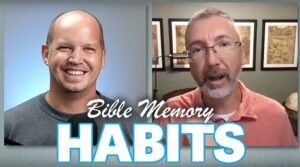Most churches today have a worship team and a prayer team, but what if your church also had a recitation team—a group of people who proclaim Scripture from memory as part of the worship service?
For many believers, that idea sounds new, maybe even intimidating. But imagine a Sunday morning where the living Word of God isn’t just read from the stage—it’s spoken from the heart, with conviction, emotion, and authenticity. That’s the power of Scripture recitation.
Why should your church include the recitation of memorized Scripture as part of a worship service?
In this post, we’re going to share five simple but powerful reasons for why reciting memorized Scripture—rather than merely reading it—can restore the Bible to the center of your church’s worship service.
1. Recitation Turns Memorization into Ministry
When most people think about Scripture memory, they think personal devotion. It’s something you do quietly, maybe at home, for your own spiritual growth. And that’s true! But as Tom Griffins from By Heart Ministry shared on the Memorize What Matters podcast, recitation takes that private discipline and turns it into a public act of worship.
“It’s not meant to be a performance,” Tom said. “It’s meant to be just a contribution to the worship service—like worship music.”
In other words, recitation isn’t about showing off what you know. It’s about letting the Word of God flow through you for the benefit of others.
When someone recites a passage from memory:
- They bring emotion and authenticity that reading often lacks.
- The message connects at a heart level, not just an intellectual one.
- Listeners hear Scripture as a living, breathing word, not a formal reading.
That’s exactly what Paul encouraged when he wrote:
“Let the word of Christ dwell in you richly, teaching and admonishing one another in all wisdom…” (Colossians 3:16)
Recitation is one of the most beautiful ways to let the Word dwell richly within you—and then overflow into the body of Christ.
2. Recitation Strengthens Faith and Unity in the Church
Churches often talk about “community,” but nothing builds unity in the church like shared Scripture. When a congregation hears someone they know—maybe a teacher, an engineer, or a teenager—reciting the Word of God from memory, something shifts. Suddenly, Scripture isn’t just the pastor’s domain. It belongs to the whole body.
Tom described how, in his church, reciters briefly introduce themselves before sharing their passage. In fifteen seconds, the congregation learns who they are and then sees them speak the truth of God from memory. It builds connection and trust.
Here’s why this matters:
- It invites participation. Not everyone can sing or play guitar, but everyone can memorize.
- It models discipleship for the next generation—kids see adults living out Deuteronomy 6:6-7: “These words that I command you today shall be on your heart. You shall teach them diligently to your children…”
- It creates shared ownership of the Word. Scripture becomes something the whole church carries, not just reads.
Imagine the impact of a congregation that doesn’t just hear the Word but speaks it together.
3. Recitation Reminds Us That God’s Word Is Alive
Reading Scripture is good—but reciting it from memory invites us to experience it differently. When you’ve spent time internalizing a passage, it moves from your mind to your heart. It becomes alive in you.

Hebrews 4:12 reminds us:
“For the word of God is living and active, sharper than any two-edged sword…”
When that living Word is spoken aloud—especially from memory—it carries a kind of power that reading alone rarely matches. There’s something about hearing truth spoken with belief that stirs hearts and renews faith.
Tom Griffins shared how recitation naturally blends into worship. He often introduces a song set by reciting a passage that connects to the theme of the next song. The transition feels seamless and Spirit-led. As he puts it, “There’s this natural meshing of worship songs with Scripture.”
When the Word is spoken in rhythm with prayer and music, it becomes the heartbeat of the entire service.
4. Recitation Builds Confidence & Courage in Believers
Let’s be honest—getting up in front of people can be scary. But there’s something profoundly strengthening about standing before others and declaring God’s Word from your heart.
As Tom said,
“You’re not going to die on stage. We practice together. We have someone ‘on book’ to prompt you if you forget a word. It’s not a burden—it’s a joy.”
That’s the beauty of recitation teams: they’re supportive, not performative.
- You have a “safety net” in your fellow reciters.
- You learn to trust that God’s Word will come back to you in the moment.
- You experience firsthand the courage that comes from proclaiming truth.
This echoes Joshua 1:8-9, where God tells His people to keep His Word on their lips and meditate on it day and night. The result?

“Be strong and courageous. Do not be afraid; do not be discouraged, for the Lord your God will be with you wherever you go.”
Recitation helps us practice that courage—one verse, one service, one Sunday at a time.
How to Get Started in Your Church
If your church doesn’t currently include recitation, it can start with you! Approach your pastor and ask if this is something you could help start. And don’t worry, you can start small:
- Begin by memorizing short passages that tie into your pastor’s sermon series.
- Introduce the concept to your pastor or worship leader as a complement to music and prayer, not another burden.
- Form a small recitation team that practices together and supports each other “on book.”
Ministries like By Heart and Bible Memory Goal offer resources, training, and community to help churches take that first step. The goal isn’t perfection—it’s participation.
And remember, recitation isn’t about performance. It’s about letting Scripture breathe again in the gathered body of Christ.
Restoring the Word to the Center
The early church devoted itself to the apostles’ teaching, the breaking of bread, and prayer (Acts 2:42). Somewhere along the way, many of our services lost the simple, spoken Word as a central act of worship.
But the movement to restore it has already begun.
When churches begin to recite Scripture together—when the Word is not just read but lived, memorized, and spoken aloud—the body of Christ is strengthened, and the heart of worship beats stronger than ever.
Want to take the next step?
Join the Bible Memory Goal Community and get access to resources, accountability groups, and opportunities to recite Scripture with others who share your passion for God’s Word.
Let’s restore th Bible to its rightful place—the very heart of worship.
Watch the Full Interview with Tom Griffins
You can watch the full interview with Tom Griffins – or listen to it on the Memorize What Matters Podcast.
Follow along with all the Bible Memory Goal YouTube videos!



Leave a Reply